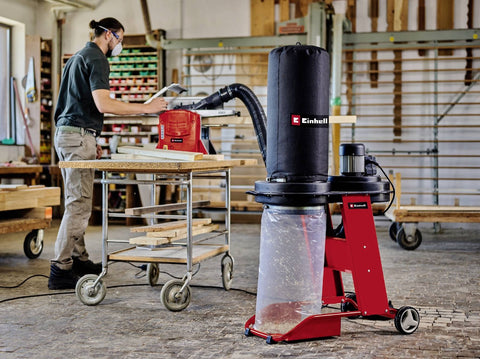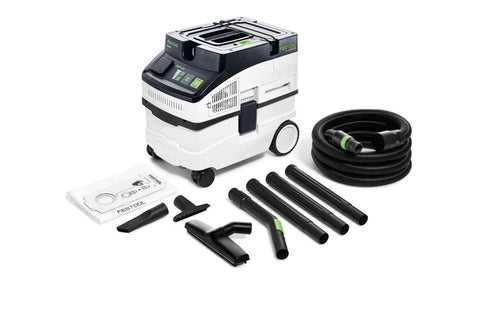
Industrial Vacuum Cleaners – Dust Extractors vs. Dust Collection
If you’re in the market for a Dust Extractor or Industrial Vacuum Cleaner, you’ll likely come across two common terms. Dust Extraction and Dust Collection. This raises the question, “Do you need one, the other, or both?” Let’s get into it…
Like all things tool-related, the ideal dust-cleaning system is determined by the work you typically do. Secondly, how much do you dislike a dusty garage or workshop?
Either way, it’s important to remember that very few industrial vacuum cleaners will remove enough dust for the air quality to be deemed “dust-free”. In that regard, nothing is more effective than a close-fitting mask, and no industrial vacuum cleaner should be seen as a health substitute.

What’s the difference between Dust Extractors & Dust Collectors?
In simple terms, Dust Extractors produce low-volume / high-pressure airflow. While in contrast, Dust Collectors produce high-volume / low-pressure airflow.
Because Dust Extractors – also known as “shop vacs” – are limited to high-pressure / low-volume tasks, their use is typically restricted to small portable tools like circular saws, sanders and routers where the extraction hose is connected directly to the tool, or used manually to suck up dust directly at the source.

Larger machines, such as table saws, mitre saws and thickness planers generally produce too much dust or cuttings for a low-volume Dust Extractor to be effective.
On that note, if you're limited to hand-held tools and small portable tasks, you can get away with owning a Dust Extractor without needing an additional collector.
However, suppose your woodworking tasks involves a large, stationary machine with big diameter dust ports. In that case, a high-volume Dust Collector will prove worthwhile.
Pros & Cons of a Dust Extractor
Pros
- Captures most dust particles before they enter the surrounding air.
- The filtering system removes ultra-fine particles.
- Portable and easy to move where needed.
- Versatile – use as a general-purpose vacuum cleaner for floors, shelves and workbenches.
Cons
- Limited to smaller machines that don’t produce large quantities of dust.
- High running costs due to frequent filter / bag replacement
Pros & Cons of Dust Collectors
Pros
- Removes dust from large woodworking machines that have bigger dust ports.
- Prevents large quantities of dust settling throughout your workshop.
- Reduces workshop cleaning time.
Cons
- Occupies significant workshop space.
- Noisy.
- Doesn’t remove dust at the source when working with smaller woodworking machines.
- More cumbersome to move around.
Buying Tips
A noticeable drawback of any Dust Extractor is that they fill their bags and filters quite quickly, thus increasing their running costs over time.
This is why a dust separator or “cyclone” is a great addition to any extractor setup, as the separator will radically reduce how often you need to replace your extractor’s bag.

Dust separators use a cyclone action that traps larger shavings and cuttings in an easy-to-empty container. The separator won’t do much to stop fine particles from entering the filter, but it will reduce how fast your extractor’s bag fills up.
Unlike general-purpose vacuum cleaners, dedicated machines like the Festool Dust Extractor offer additional features like variable speed control, a super silent operation, excellent filtration, and the ability to automatically switch on and off when you use your tools.


Leave a comment